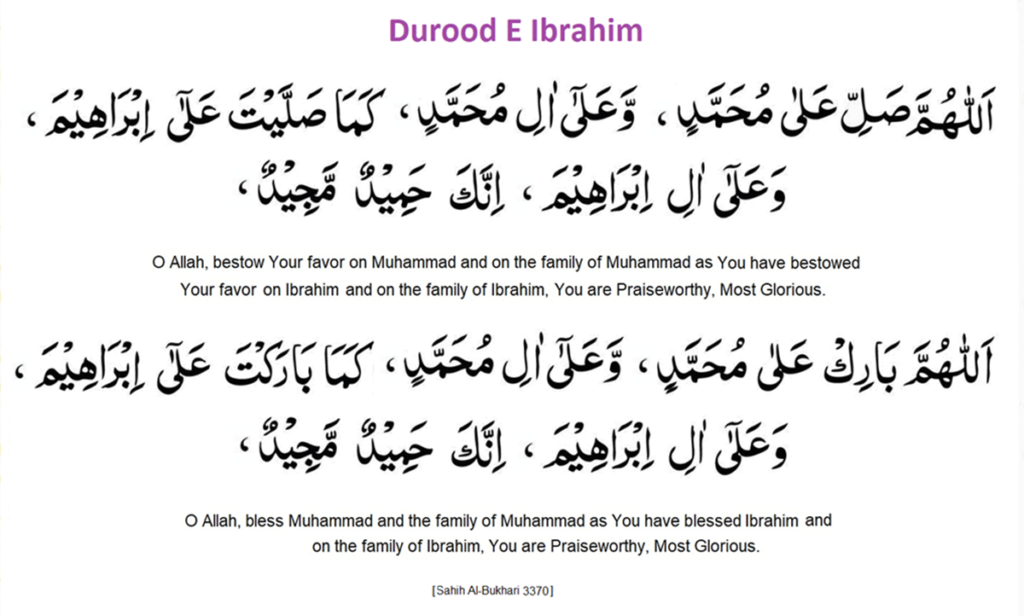Durood Sharif, particularly the Durood Ibrahimi, holds a special place in the hearts of Muslims around the world. It is a prayer of blessings that we send upon Prophet Muhammad (PBUH) and his family. Reciting this Durood not only strengthens our connection with the Prophet but also brings countless blessings and rewards from Allah Almighty (SWT).
Learn 6 Kalimas, Durood Ibrahimi, Five Pillars of Islam, Short Surahs, and Duas in our Islamic studies course with our male and female Quran tutors. Sign up for a free trial today!
What is Durood Ibrahimi?
Durood Ibrahimi is a part of the Salat (prayer) recited during Tashahhud, the sitting position in Salah. It is one of the most widely recited Duroods and is considered to be the most complete and comprehensive form of sending blessings upon the Prophet (PBUH).
The Durood Ibrahimi is as follows:
Durood-e-Ibrahim in Arabic

“اللهم صل على محمد وعلى آل محمد کما صليت على إبراهيم وعلى آل إبراهيم إنك حميد مجيد، اللهم بارك على محمد وعلى آل محمد کما باركت على إبراهيم وعلى آل إبراهيم إنك حميد مجيد”
English Transliteration of Durood Ibrahimi:
Allahumma salli ala Muhammadiw wa ala aali Muhammadin kama sall’aita ala Ibrahima wa ala aali Ibrahima inna’ka hamidum majeed. Allahumma barik ala Muhammadiw wa ala aali Muhammadin kama barakta ala Ibrahima wa ala aali Ibrahima inna’ka hamidum majeed.
Darood Sharif in English:
“O Allah, send your favor upon Muhammadﷺ and upon the family of Muhammadﷺ, as You sent favor upon Ibrahim and upon the family of Ibrahim. You are indeed praiseworthy, glorious. O Allah, bless Muhammadﷺ and the family of Muhammadﷺ, as You blessed Ibrahim and the family of Ibrahim. You are indeed praiseworthy, glorious.”
Short Version of Darood Sharif
The shortest version of Darood Sharif commonly recited is “Sall’allahu Alaihi Wa Aalihi Wa Salam” (صَلّى اللهُ عَلَيْهِ وآله وَسَلَّمَ).
Other short versions include:
صَلَّى اللَّهُ عَلَى النَّبِيِّ مُحَمَّدٍ
Transliteration: Sallal laho Ala-Nabi Muhammad ﷺاللَّهُمَّ صل عَلَى مُحَمَّدٍ وَعَلَى آلِ مُحَمَّدٍ
Transliteration: Allahumma Sallay Ala Muhammad wa-ala Ale Muhammad ﷺاللَّهُمَّ صَلِّ عَلَى مُحَمَّدٍ النَّبِيِّ الْأُمِّيِّ، وَعَلَى آلِ مُحَمَّدٍ
Transliteration: Allahumma Sall Ealaa Muhammad Al-Nabi Al-Ummi, wa-ala Ale Muhammad ﷺ
These short Darood Sharif phrases can be recited at any time, and they all express sending blessings upon Prophet Muhammad ﷺ and his followers.
If you’re just beginning your Quran learning journey, we suggest enrolling in our online Noorani Qaida course or Quran reading course. Our qualified teachers are here to help kids, adults, and women read, recite, and memorize the Quran from home—all at an affordable price.
Significance of Durood Ibrahimi
Reciting Durood Ibrahimi is a powerful act of worship that has immense spiritual benefits. It is a means of showing our love and respect for the Prophet Muhammad (PBUH). The Prophet himself emphasized the importance of sending blessings upon him, and Durood Ibrahimi is a beautiful and eloquent way to do so.
One of the key aspects of Durood Ibrahimi is that it not only asks for blessings upon the Prophet Muhammad (PBUH) but also includes the family of Prophet Ibrahim (PBUH). This connection underscores the continuity of the prophetic mission and the shared heritage of monotheistic faiths.
Benefits of Reciting Durood Ibrahimi
Spiritual Rewards: Reciting Durood Ibrahimi brings immense rewards in the Hereafter. It is said that those who frequently send blessings upon the Prophet (peace be upon him) will be closest to him on the Day of Judgment.
Forgiveness of Sins: It is believed that reciting Durood Sharif helps in the forgiveness of sins and earns the mercy of Allah.
Increased Love for the Prophet (PBUH): Regular recitation of Durood Ibrahimi deepens a believer’s love and reverence for the Prophet Muhammad (PBUH), bringing them closer to his Sunnah (practices).
Protection from Hardships: Many believe that reciting Durood Ibrahimi provides protection from difficulties and brings peace to the heart and mind.
Acceptance of Prayers: It is a common practice to recite Durood Ibrahimi before and after making a supplication (Dua), as it is believed to make the Dua more likely to be accepted by Allah.
Incorporating Durood Ibrahimi into Daily Life
Muslims are encouraged to incorporate the recitation of Durood Ibrahimi into their daily lives. Whether during Salah, in moments of quiet reflection, or before making Dua, this Durood serves as a constant reminder of the Prophet’s importance in our lives and our duty to honor him.
Final Words on Durood Ibrahimi
In conclusion, Durood Ibrahimi is not just a prayer; it is a means of attaining closeness to Allah and His Messenger. By regularly reciting this Durood, we invite countless blessings into our lives, seek forgiveness, and express our deepest respect for the Prophet Muhammad (PBUH).
May Allah (SWT) grant us the ability to continuously send blessings upon our beloved Prophet and benefit from the spiritual rewards that come with it.
Quran Focus Academy offers online Quran classes for children, covering everything from basic to advanced levels. Our Quran courses include Quran recitation with Tajweed, Quran memorization, and more.
Sign up for one week free trial.


